Faculty of Engineering
Facilities
Explore the state-of-the-art facilities at FOE that are purposefully designed to foster hands-on learning, drive innovative research and development, and empower students to excel in the dynamic world of computing.
Civil Engineering Department Building Nears Completion
- Structural and Concrete Engineering Laboratory
- Transportation Engineering Laboratory
- Geotechnical Engineering and Surveying Laboratory
- Water Resources and Environmental Engineering Laboratory
- Engineering Drawing Laboratory
- Computer-Aided Design Laboratory
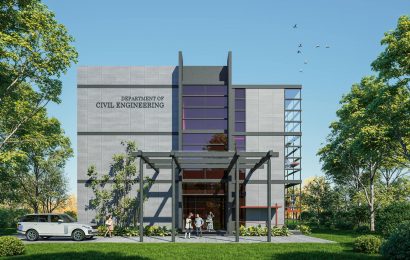
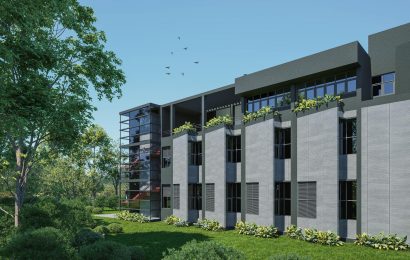
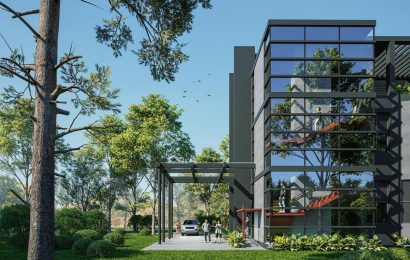
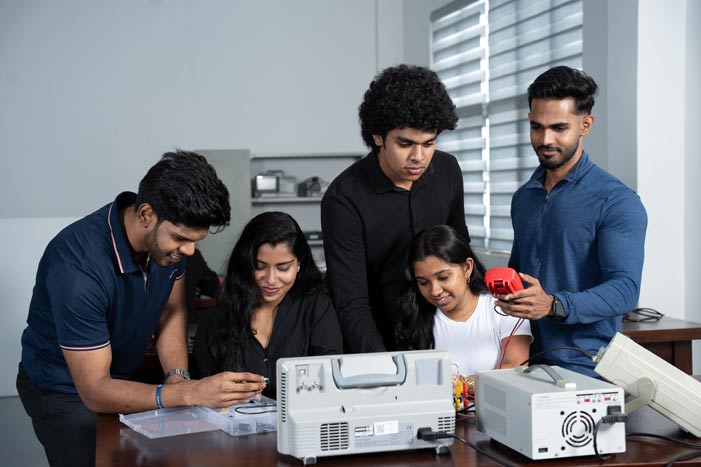
Equipped with six fully functional experimental setups, each comprising an AC waveform generator, DC power supply, oscilloscope, and digital multimeter, the Electronics Laboratory provides a hands-on learning environment for students pursuing basic electrical engineering and electronics modules. Designed to support collaborative learning, the lab accommodates 18 students at a time, organized into six groups of three. This modern facility enables students to explore real-world circuit behavior, test electronic components, and reinforce theoretical knowledge through practical experimentation.
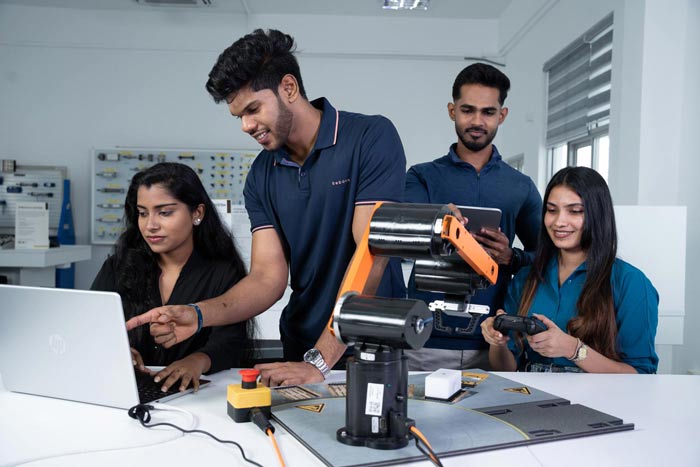
The Computer Systems and Robotics Laboratory is a dynamic, multi-disciplinary facility featuring 9 specialized laboratory stations, each tailored to provide hands-on experience across a wide range of modern engineering applications. Each station accommodates up to 3 students, promoting interactive and team-based learning.
Students gain practical exposure to key areas such as:
- PLC and Control System Applications
- Electrical Machines, Drives, and Protection
- Hydraulic and Pneumatic Systems
- Electro-Pneumatics and Mechatronics
- Power Electronics and Energy Systems
• Digital Electronics Design
• Advanced Robotics, including a 4D Robot Arm with PLC Integration
• Mobile Robotics and Pendulum Control Systems
This lab supports practical sessions for modules related to Machines and Drives, Power Electronics, Digital Electronics, Hydraulics and Pneumatics, Robotics, and Automation, making it a cornerstone for engineering innovation and applied learning.
The Engineering Design Laboratory is a state-of-the-art computer lab equipped with 24 high-performance PCs loaded with the latest licensed engineering and design software such as AutoCAD, SolidWorks, Siemens NX, MATLAB, FluidSIM, SketchUp, and Adobe Creative Suite.
The lab also features an overhead projector, a dedicated high-end PC for the instructor, and a whiteboard to facilitate interactive teaching and demonstrations. This environment enables students to design, simulate, and visualize their engineering projects using industry-standard tools, bridging the gap between theory and real-world application.
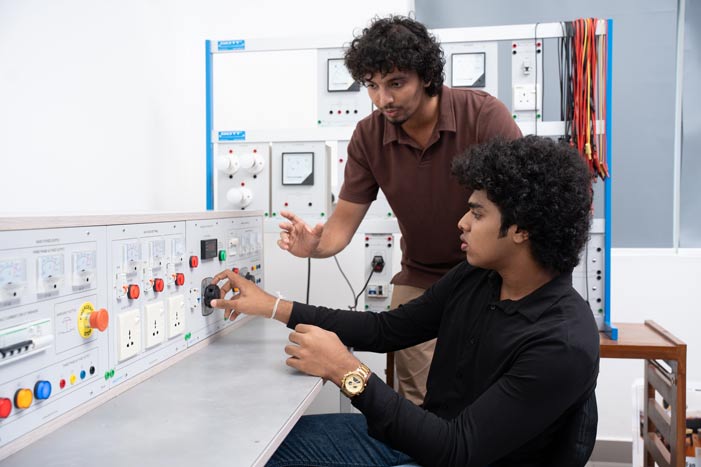
The Electrical Power and Machines Laboratory is a well-equipped facility designed to support a wide range of practicals—from foundational concepts like Ohm’s Law to advanced studies involving single-phase transformers and unbalanced systems.
The lab features various types of electrical power supplies, along with both analog and digital voltmeters and ammeters, enabling students to develop hands-on experience with traditional and modern measurement tools.
In addition, the laboratory supports electromagnetics experiments, including demonstrations using a Faraday ice pail, variable gap magnets, and eddy current blades, making it an essential learning space for students exploring the fundamentals of electrical engineering and power systems.
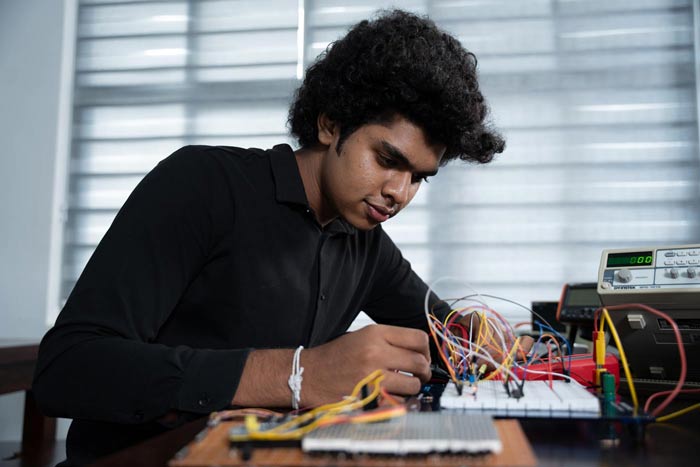
The Telecommunication Laboratory offers a comprehensive environment for practical exploration of Communication Systems and Networks. It is equipped with communication trainers, function generators, oscilloscopes, power supplies, and a spectrum analyzer, providing students with hands-on experience in analyzing and working with real-world communication signals.
Key experimental areas include:
- Amplitude Modulation (AM): Study of AM wave characteristics and signal behavior.
- Frequency and Phase Modulation (FM & PM): Understanding generation, processing, and detection circuits.
- Suppressed Carrier Modulation (DSB & SSB): Analysis and implementation of Double Sideband and Single Sideband signals using relevant circuitry.
The addition of a spectrum analyzer enables students to visually examine signal frequencies, bandwidth, and modulation properties, further enhancing their understanding of modern communication technologies.
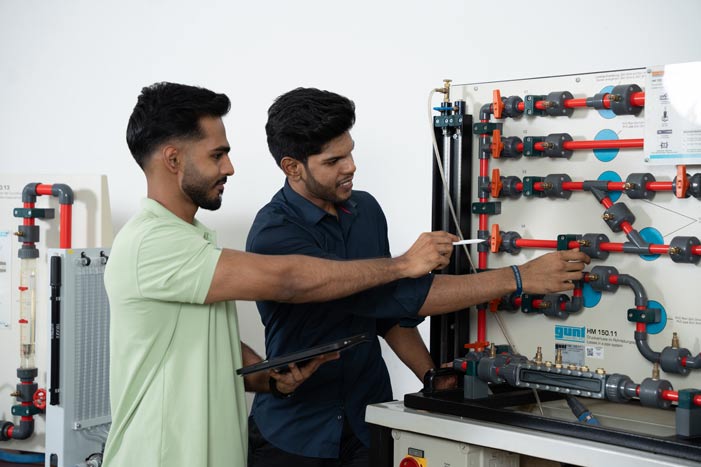
The Mechanical Engineering Laboratory is a versatile, multi-station facility designed to support hands-on learning in Thermodynamics, Fluid Dynamics, and Materials Engineering.
The lab consists of 6 specialized stations:
- 2 Thermodynamics Stations – Each accommodating 4 students, allowing experiments in heat transfer, energy conversion, and thermodynamic cycles across six different setups.
- 2 Fluid Dynamics Stations – Designed for analyzing flow measurement techniques, head losses in piping systems, and fluid behavior under various conditions.
- 2 Materials Stations – Supporting five types of experiments, each station accommodates 3 students, enabling investigations in material properties, stress-strain behavior, and failure analysis.
This laboratory provides an essential foundation for students to connect theoretical concepts with real-world applications in mechanical engineering.
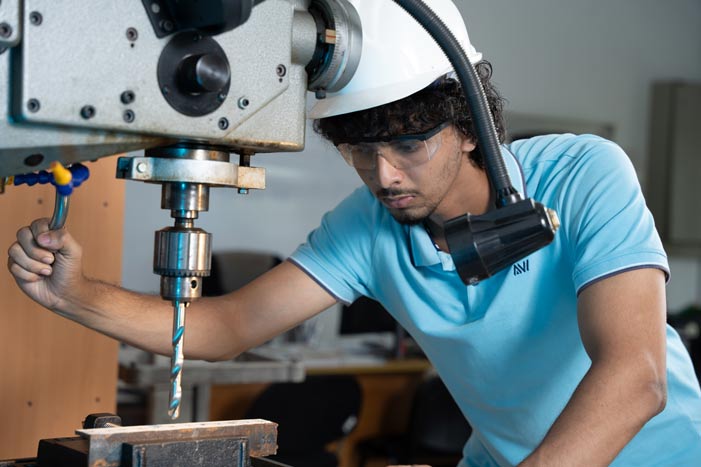
The Engineering Workshop offers students essential hands-on training in fundamental mechanical and safety practices, forming a strong foundation for their engineering education and project work.
Key learning areas include:
- Introduction to Industrial Safety practices and protocols
- Familiarization with Measuring Instruments and common Workshop Equipment
- Basic Arc Welding Techniques
- Operation of Lathe and Drill Machines
Students gain practical experience with real tools and machinery, applying their knowledge across design and fabrication activities in their 1st to 4th year projects. This workshop serves as a critical stepping stone from theory to practical engineering application.
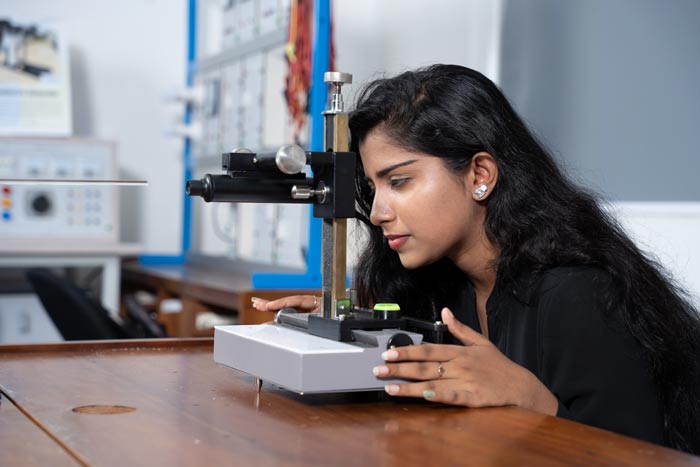
The Physics Laboratory is a dedicated facility that supports hands-on learning and experimentation in key areas of physics, including mechanics, waves and oscillations, thermal physics, optics, and material properties. It plays a vital role in bridging theoretical concepts with practical applications.
Available facilities and equipment consist of:
- Measurement Instruments: Vernier calipers, micrometer screw gauges, and travelling microscopes are used to train students in precise dimensional analysis and experimental accuracy.
- Mechanics and Forces Apparatus: Equipment to demonstrate basic force-related concepts such as the parallelogram of forces and the principle of moments.
- Waves and Oscillations: Experimental setups such as simple pendulums and helical springs allow students to investigate time-period relationships and harmonic motion.
- Thermal Physics Apparatus: Tools for investigating specific heat capacity, latent heat of fusion, and gas laws through experiments involving calorimetry, temperature-volume relationships, and heat exchange methods.
- Optics Equipment: Prisms and related optical setups allow for determination of refractive indices, angles of deviation, and critical angles, providing insight into light behavior and material transparency.
- Material Properties Testing: Apparatus for determining Young’s modulus of metals and surface tension of liquids, enabling the study of mechanical behavior and intermolecular forces.
This laboratory offers students a strong foundation in experimental physics, enhancing their analytical and observational skills while reinforcing theoretical knowledge through structured experimentation.
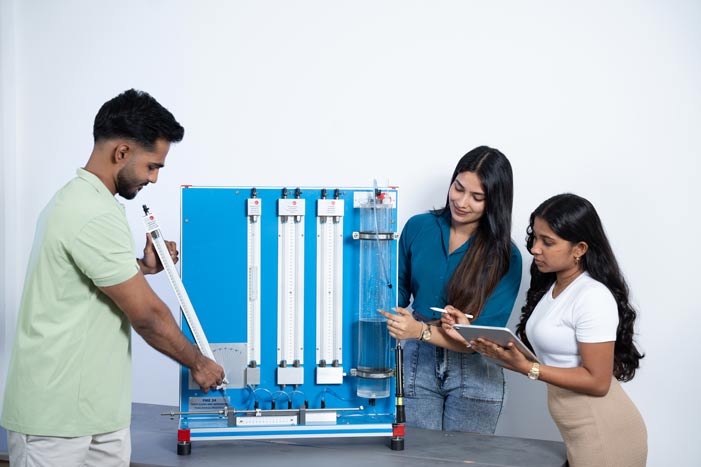
The Civil Engineering Laboratory is a multidisciplinary practical facility that supports teaching, experimentation, and research in key civil engineering domains including hydraulics, structural mechanics, geotechnical engineering, surveying, and materials testing.
Key facilities and equipment include:
- Hydraulic Engineering Equipments: A range of experimental setups for fluid statics and fluid dynamics, allowing practical investigation of flow patterns, pressure measurement, and fundamental fluid behavior.
- Structural Engineering Equipments: Apparatus such as the portal frame setup is available to study structural behavior, deformation, load distribution, and internal force development in structural elements.
- Surveying Instruments: Total stations, GNSS receivers, levelling instruments, and manual drafting instruments are provided for training in field surveying, topographic mapping, and construction layout work.
- Geotechnical Engineering Equipments: Standard and modified Proctor test apparatus for soil compaction studies, along with sieve shakers and sieve sets for particle size distribution (sieve analysis).
- Aggregate and Construction Materials Testing Equipment: Tools for analyzing aggregate gradation, moisture content, and other essential properties of construction materials.
This laboratory provides essential hands-on training aligned with academic and industry standards, helping students gain practical experience in core civil engineering competencies.

